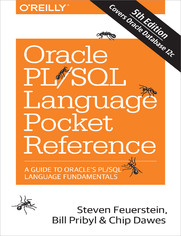Oracle PL/SQL Language Pocket Reference. 5th Edition - Helion

ISBN: 978-14-919-1996-5
stron: 190, Format: ebook
Data wydania: 2015-09-09
Ksi─Ögarnia: Helion
Cena ksi─ů┼╝ki: 29,90 z┼é (poprzednio: 49,83 z┼é)
Oszczędzasz: 40% (-19,93 zł)
Be more productive with the Oracle PL/SQL language. The fifth edition of this popular pocket reference puts the syntax of specific PL/SQL language elements right at your fingertips, including features added in Oracle Database 12c.
Whether you’re a developer or database administrator, when you need answers quickly, the Oracle PL/SQL Language Pocket Reference will save you hours of frustration with concise summaries of:
- Fundamental language elements, such as block structure, datatypes, and declarations
- Statements for program control, cursor management, and exception handling
- Records, procedures, functions, triggers, and packages
- Execution of PL/SQL functions in SQL
- Compilation options, object-oriented features, collections, and Java integration
This handy pocket reference is a perfect companion to Steven Feuerstein and Bill Pribyl’s bestselling Oracle PL/SQL Programming.
Osoby które kupowały "Oracle PL/SQL Language Pocket Reference. 5th Edition", wybierały także:
- Oracle PL/SQL Programming. 4th Edition 199,33 zł, (29,90 zł -85%)
- Oracle PL/SQL Programming: A Developer's Workbook 166,11 zł, (29,90 zł -82%)
- Oracle PL/SQL for DBAs 135,91 zł, (29,90 zł -78%)
- Oracle Essentials. Oracle Database 11g. 4th Edition 124,58 zł, (29,90 zł -76%)
- Mastering Oracle SQL. 2nd Edition 124,58 zł, (29,90 zł -76%)
Spis tre┼Ťci
Oracle PL/SQL Language Pocket Reference. 5th Edition eBook -- spis tre┼Ťci
- Introduction
- Acknowledgments
- Conventions
- PL/SQL Language Fundamentals
- PL/SQL Character Set
- Identifiers
- Boolean, Numeric, and String Literals
- Numeric Literals
- Datetime Interval Literals
- Delimiters
- Comments
- Pragmas
- Statements
- Block Structure
- Variables and Program Data
- Scalar Datatypes
- Numeric datatypes
- Character datatypes
- Unicode character datatypes
- Datetime datatypes
- BOOLEAN datatype
- LOB Datatypes
- Implicit Datatype Conversions
- NULLs in PL/SQL
- Declaring Variables
- Constrained declarations
- Constants
- Default values
- Anchored Declarations
- Programmer-Defined Subtypes
- Scalar Datatypes
- Conditional and Sequential Control
- Conditional Control Statements
- IF-THEN combination
- IF-THEN-ELSE combination
- IF-THEN-ELSIF combination
- CASE statement
- CASE expression
- Sequential Control Statements
- GOTO
- NULL
- Conditional Control Statements
- Loops
- Simple Loop
- Numeric FOR Loop
- Cursor FOR Loop
- WHILE Loop
- Repeat Until Loop Emulation
- EXIT Statement
- CONTINUE Statement
- Loop Labels
- Database Interaction
- Sequences in PL/SQL
- Transaction Management
- COMMIT
- ROLLBACK
- SAVEPOINT
- SET TRANSACTION
- LOCK TABLE
- Autonomous Transactions
- Cursors in PL/SQL
- Explicit Cursors
- Declaring explicit cursors
- Opening explicit cursors
- Fetching from explicit cursors
- Closing explicit cursors
- Explicit cursor attributes
- Implicit Cursors
- SELECT FOR UPDATE clause
- WHERE CURRENT OF clause
- Native Dynamic SQL
- DBMS_SQL
- SQL Injection and Bind Variables
- Cursor Variables
- Cursor Expressions
- Explicit Cursors
- Exception Handling
- Declaring Exceptions
- Raising Exceptions
- Scope
- Propagation
- WHEN OTHERS clause
- SQLCODE and DBMS_UTILITY formatters for exception handlers
- Exceptions and transactions
- Records in PL/SQL
- Declaring Records
- Referencing a Records Fields
- Assigning Records
- Records and DML
- Nested Records
- Collections in PL/SQL
- Declaring a Collection
- Initializing a Collection
- Adding and Removing Elements
- Nested Table Functions
- Collection Methods
- Collections and Privileges
- Nested Collections
- Bulk Binds
- Built-in Functions and Packages
- Built-in Functions
- Conversion functions
- String functions
- Numeric functions
- Date and time functions
- Built-in Regular Expression Functions
- Metacharacters
- REGEXP_COUNT
- REGEXP_LIKE
- REGEXP_INSTR
- REGEXP_SUBSTR
- REGEXP_REPLACE
- Match modifiers
- Built-in Functions
- Stored Procedures and Functions
- Procedures
- Functions
- Parameters
- Datatype
- Mode
- Default values
- Parameter-passing notations
- Local Programs
- Program Overloading
- Forward Declarations
- Table Functions
- Function Result Cache
- Privileges and Stored PL/SQL
- Triggers
- Creating Triggers
- Trigger Predicates
- DML Events
- Compound DML Triggers
- DDL Events
- Database Events
- Packages
- Package Structure
- Referencing Package Elements
- Package Data
- SERIALLY_REUSABLE Pragma
- Package Initialization
- Calling PL/SQL Functions in SQL
- Calling a Function
- Improving Performance of Calling PL/SQL Functions from SQL
- Column Name Versus Function Name Precedence
- Object-Oriented Features
- Object Types
- Type Inheritance
- Methods
- Member methods
- Static methods
- Constructor methods
- Comparison methods
- Methods in Subtypes
- Manipulating Objects in PL/SQL and SQL
- Upcasting and Downcasting
- REF operator
- VALUE operator
- DEREF operator
- Changing Object Types
- Compilation
- Compiling Stored PL/SQL Programs
- Conditional Compilation
- Compiler Warnings
- Optimizing Compiler
- Performing Native Compilation of PL/SQL
- Java Language Integration
- Example
- Publishing Java to PL/SQL
- Data Dictionary
- Index





